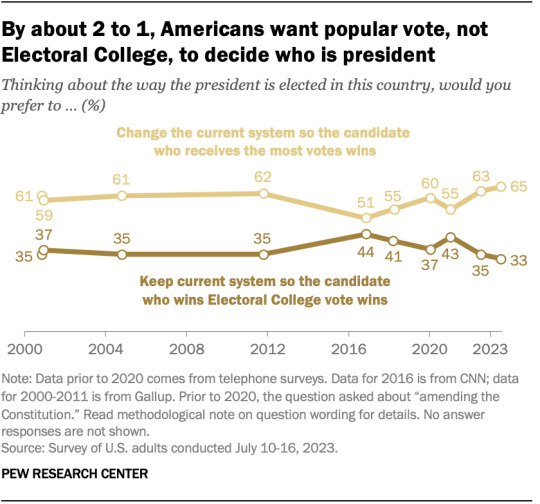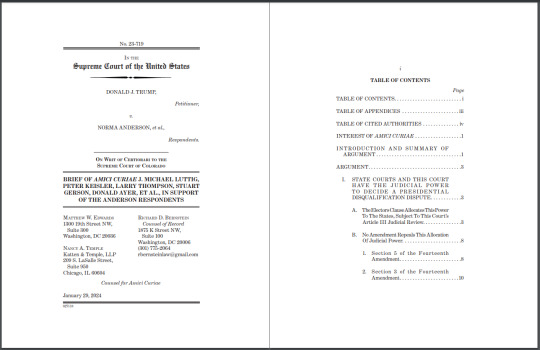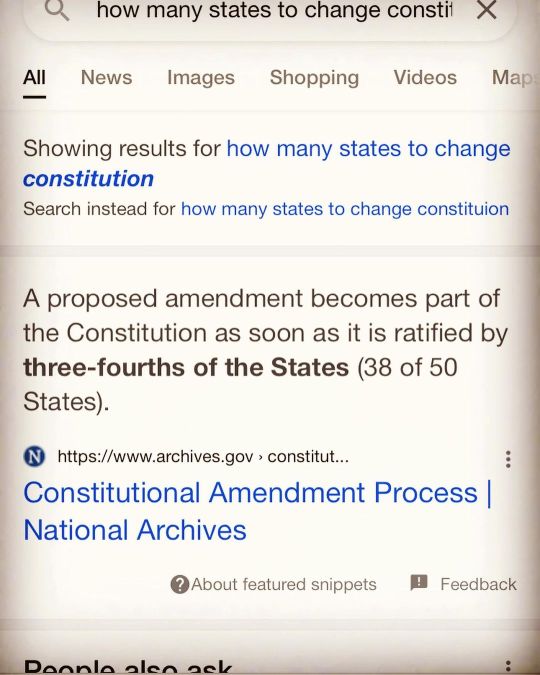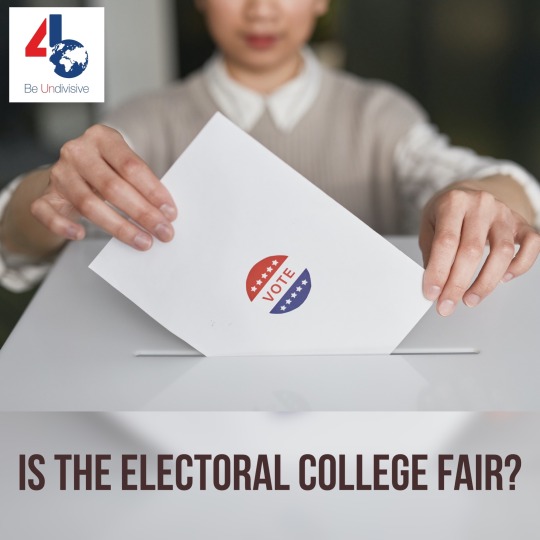#electoralcollege
Photo

By about 2 to 1, Americans want popular vote, not Electoral College, to decide who is president
823 notes
·
View notes
Text
Judge Rejects Trump's Immunity Claim in Election Lawsuit: What Happens Next?
#2020election #accountability #appeal #audits #battlegroundstates #Democraticlawmakers #democraticprocess #discovery #donaldtrump #electionresults #electoralcollege #immunityclaim #impeachmenttrial #investigations #JoeBiden #JudgeSullivansruling #legalchallenges #legalchallenges. #publicofficials #ruleoflaw #testimony #Trumpslegalteam #violationofoathofoffice #voterfraud #voterlawsuit
#Politics#2020election#accountability#appeal#audits#battlegroundstates#Democraticlawmakers#democraticprocess#discovery#donaldtrump#electionresults#electoralcollege#immunityclaim#impeachmenttrial#investigations#JoeBiden#JudgeSullivansruling#legalchallenges#legalchallenges.#publicofficials#ruleoflaw#testimony#Trumpslegalteam#violationofoathofoffice#voterfraud#voterlawsuit
0 notes
Text
Analysis of: Amicus brief with the U.S. Supreme Court arguing that former President Trump is disqualified to run for public office under Section 3 of the 14th Amendment

PDF Download: https://www.supremecourt.gov/DocketPDF/23/23-719/299107/20240129171610494_23-719_Amici%20Brief.pdf
Summary of the key points from the discussion:
The document is an amicus curiae brief submitted to the US Supreme Court in a case regarding Donald Trump's eligibility to run for president again.
It argues that state courts and the Supreme Court have judicial power over presidential qualification disputes based on constitutional text and that no amendment changed this.
Section 3 of the 14th Amendment must be given its fair meaning rather than a narrow construction, and was widely understood to include the president as an "officer."
The January 6th attack constituted an "insurrection…against" the Constitution by seeking to deny the peaceful transfer of power mandated by the Executive Vesting Clause and amendments.
Trump "engaged in" the insurrection by inciting violence through his speech aimed at preventing the certification of Biden's election.
The brief makes persuasive legal and historical arguments supported by evidence and shows fidelity to constitutional text and principles of interpretation.
Stakeholders impacted include the Court, Trump, Biden, Congress, future candidates, and the American public.
The reasoning is intellectually rigorous and addresses counterarguments transparently based on original public meaning.
Ethically, it prioritizes democratic processes, rule of law, facts over claims, and impartial treatment of issues.
This document is an amicus curiae ("friend of the court") brief submitted to the US Supreme Court.
The key attributes that identify it as an amicus brief genre include:
It is submitted by parties not directly involved in the case (former government officials here) to provide legal arguments to the Court.
It discusses the legal issues in the case indepth and provides analysis of relevant constitutional provisions, precedents, and historical context to support a particular interpretation.
It is formally structured with sections laying out arguments, citations to authority, inclusion of an appendix, etc. following the expected format for legal briefs.
The language and writing style is formal and targeted at legal/judicial audiences, citing authorities and precedent.
It aims to assist the court rather than the direct parties, showing the issues have broader implications than just those directly involved in the case.
So in terms of both form and function, this document clearly falls within the established genre of an amicus curiae brief submitted for a Supreme Court case, a genre intended to help inform the Court's legal decisionmaking.
Summary of the amici brief:
The brief argues that state courts and the US Supreme Court have the judicial power to decide disputes over a presidential candidate's qualifications under the Constitution.
This power was originally allocated to the states under the Electors Clause, and ultimately to the Supreme Court via its appellate jurisdiction.
Section 5 of the 14th Amendment gave Congress additional enforcement power but did not eliminate the pre-existing judicial power of state courts and the Supreme Court.
No other constitutional amendment changes this allocation of judicial power or assigns such power to Congress.
Section 3 of the 14th Amendment must be given its "fair meaning" rather than a narrow construction, especially since it emerged from the Civil War.
In 1868 when the 14th Amendment was ratified, the "President of the United States" was widely understood to be an "officer of the United States."
The January 6, 2021 attempt to prevent Congress from certifying the election results through force was an "insurrection…against" the Constitution.
The peaceful transfer of power is mandated by the Executive Vesting Clause, the 12th Amendment, and the 20th Amendment.
Trump "engaged in" the insurrection by inciting the violent mob through his speech, even if he did not personally commit violence.
Evaluation of how well the amicus brief engages with and relates to the supreme law of the affected country, the United States Constitution:
Centrality of constitutional text: The core focus is a close reading and application of the most directly relevant constitutional clauses to the issues at hand.
Originalist interpretation: An original public meaning approach is taken, grounded in founding-era context and sources to interpret clauses as ratified.
Holistic assessment: Relevant clauses are analyzed both individually and together as part of an interrelated whole (e.g. factoring in amendments together).
Precedent consideration: Both key founding intentions and relevant precedent rulings interpreting provisions are thoroughly discussed.
Consistency evaluation: Arguments are structured around demonstrating logical consistency with overarching constitutional structures/principles.
Engagement with counterarguments: Attempts are made to engage potential alternative textualist perspectives rather than just asserting one view.
Overall, the detailed emphasis on the specific wording of clauses both individually and systematically, due attention to original public meaning and precedent, and efforts to ensure consistency indicate the brief strongly prioritizes meaningful engagement with the text of the supreme law it is commenting upon. This lends it credibility in relation to the U.S. Constitution.
Evaluation of the key arguments:
Judicial power argument: This argument is well supported by careful textual analysis of relevant Constitutional clauses and founding-era context. It directly counters Trump's position.
Officer argument: Though a narrower point, it is effective that Trump concedes the key aspect (president is an officer) while the brief cites supportive context.
Insurrection argument: Defining insurrection as denial of peaceful transfer is a persuasive interpretation aligned with Constitutional mandates and historical precedent of 1861 secession attempts.
Incitement argument: The contention that causing threatened/actual violence through speech constitutes engagement is legally sound and contextual evidence cited for Trump's intent strengthens this claim.
Constitutional fidelity: Overall the brief exhibits strong constitutional textualism through principle-driven interpretation anchored in original public meaning - lending the analysis credibility.
The arguments presented appear well supported by both evidence and reason. While legal experts can reasonably disagree on interpretations, the brief's key positions seem well grounded and its analysis of the language and context is thoughtful. No obvious logical flaws or omissions were identified. The arguments effectively rebut the positions taken in Trump's brief.
Key stakeholders:
US Supreme Court - The intended audience, to inform the legal analysis and contribute sound legal/historical reasoning.
Donald Trump - Directly impacted by the outcome of the case and arguments made against his positions.
Joe Biden - As the duly elected incumbent president, his ability to serve is impacted.
American public - The stability of the democratic process and future elections could be influenced by the ruling.
Political parties - Depending on outcome, future nominations and contests may be affected.
Other future presidential candidates - Precedents set may influence qualifications and elections.
Congress - Division of powers between judiciary and legislature could be delineated.
Overall, while some stakeholders like Trump may be more directly affected as parties, the legal issues have broader public interest implications for how the US system of government functions now and in the future. The brief aims to assist the Court's consideration of these wider stakes through persuasive legal analysis.
Evaluation of the ethics involved in the situation described:
Democratic norms: The brief argues forcefully preventing a peaceful transfer of power fundamentally undermines democratic processes the Constitution aims to protect.
Rule of law: It contends adjudicating disputes through impartial courts, rather than unreviewable political power, upholds principles of an equitable legal system.
Constitutional integrity: Close analysis is offered to demonstrate how the arguments align with or diverge from upholding the supreme law of the land as ratified.
Truth & transparency: Reliance is placed on transparent discussion of evidence, rather than obfuscation or unfounded claims, to determine facts.
Impartiality: While advocating one conclusion, care is shown to addressing alternative views on their legal/historical merits impartially.
Civic duty: Former officials file to aid the Court based on non-partisan commitment to constitutional order, not selfish interests.
Overall, core ethical priorities of the brief appear to include safeguarding democratic and constitutional governance through commitment to facts/evidence, impartial reason, rule of law, and disinterested service - all hallmarks of principled legal/scholarly ethics. No overt unethical biases or tactics are apparent.
Quality of reasoning:
Textualism: The brief closely analyzes the specific wording and contextual meanings of relevant constitutional clauses, applying an original public meaning approach. This adheres to principles of textualist legal interpretation.
Logical coherence: The arguments flow logically from one point to the next, building a case based on interrelated evidentiary threads (e.g. starting with federalism foundations and moving clause-by-clause).
Use of evidence: Strong empirical support is provided through citations of founding-era sources, legal precedents, historical works, dictionaries, and the record established in lower court proceedings.
Addressing counterarguments: Attempts are made to directly rebut alternative views raised rather than just asserting one perspective. Relevant objections are substantively engaged.
Transparency: Assumptions and line of reasoning are clearly spelled out, leaving evidentiary trail open to scrutiny rather than relying on opacity.
Intellectual rigor: A high level of consistent analytical rigor is applied throughout in evaluating text and context without apparent lapses.
Overall, the reasoning exhibits qualities expected of rigorous legal/scholarly analysis through its focus on principle-driven interpretation of relevant sources and transparent engagement with alternative perspectives. While reasonable people can disagree on conclusions, the quality of reason itself appears solid.
Logical fallacies:
Appeal to Authority - The brief appeals to the expertise and credibility of the amici signatories. However, this is a standard and valid technique for amicus briefs to establish credibility. Not a clear fallacy.
Strawman - Nowhere does the brief clearly misrepresent Trump's arguments. It accurately repeats and rebuts the positions taken in his brief. No evident strawmanning.
Slippery Slope - The brief argues Congress having sole power could lead to abuse, but this is a reasonably argument rather than a blatant slippery slope fallacy.
False Dilemma - The brief does not frame the issues in an either-or way or ignore alternative possibilities. Multiple constitutional provisions are discussed working together.
Ad Hominem - The brief focuses on the legal and historical merits of the arguments rather than make personal attacks on Trump.
Post Hoc - The brief does not inappropriately claim historical events were caused by other events that occurred after. Causation is reasonably discussed.
In evaluation, I did not find any clear instances of logical fallacies that would meaningfully undermine the legal and historical arguments being made in the brief. At most, some techniques could be debated, but overall the reasoning appears logically sound and fallacy-free.
Common criteria for evaluating and assessment:
Credibility of Amici - The brief relies on perspectives from numerous high-ranking former officials and legal experts, lending credibility.
Clarity of Arguments - The legal arguments are clearly structured and explained in accessible language for legal audiences.
Persuasiveness - The brief compellingly applies constitutional text and history to dispute Trump's claims and support disqualification.
Relevance to Court - The brief focuses on relevant constitutional/legal issues before the court rather than simply reinforce one side.
Thoroughness - The brief thoroughly examines all key constitutional provisions and rebuts counterarguments.
Objectivity - While supporting one outcome, the brief remains evenly balanced and relies on facts/law rather than unsubstantiated claims.
Compliance with Guidelines - The brief follows standard guidelines for amicus briefs in terms of formatting, citation practices, etc.
Innovation - The brief introduces some novel historical evidence and analysis that could helpfully inform the Court's decision.
Overall, this brief excels in terms of the credibility and expertise it carries, the clarity and persuasiveness of its arguments, its thorough examination of key issues, compliance with genre guidelines, and potential to innovatively inform the Court's ruling. It achieves the intended purpose of an effective amicus brief.
#SCOTUSbrief#January6th#14thAmendment#Trump2024#ElectionSecurity#PresidentialQualifications#TransferOfPower#Insurrection#ConstitutionalLaw#VoterRights#USDemocracy#RuleOfLaw#ElectoralCollege#POTUS#SCOTUS#TrumpAccountability#CongressionalPowers#VicePresident#BidenPresidency#PublicServiceEthics
0 notes
Text

Post: yall keep on cryin,theyll keep on lyin,and well... https://www.blaqsbi.com/5oLy
0 notes
Text
Sen. Klobuchar Thanks MSNBC For Being The Gold Star Of Truth
http://dlvr.it/SZ4mC0
0 notes
Photo

In yet another anonymous iPhone 📱 screenshot leak from #bradley2024 POTUS47 campaign to @FoxNews @Twitter “phenomenal” strategic calculations re: #statehood 🇵🇷 #puertorico #WashingtonDC #Constitution #amendments #neoERA #electoralcollege 2 secure #neorepublican #supermajority 🇺🇸 @hooverinstitution @gop @statedept @instagram @meta (at Kings Mountain, California) https://www.instagram.com/p/CdY5FGfPI2l/?igshid=NGJjMDIxMWI=
#bradley2024#statehood#puertorico#washingtondc#constitution#amendments#neoera#electoralcollege#neorepublican#supermajority
1 note
·
View note
Text
Tweeted
Participants needed for online survey! Topic: "Electoral College Versus Direct Popular Vote" https://t.co/wJD5V4RLDJ via @SurveyCircle #voting #PopularVote #ElectoralCollege #UnitedStatesPolitics #usa #election #survey #surveycircle https://t.co/38Ex11xHEi
— Daily Research @SurveyCircle (@daily_research) Nov 26, 2022
0 notes
Text

The Electoral College was established in the Constitution under Article II, Section 1, and was further clarified to be what we know it as today in the 12th Amendment.
There are 538 electors, and a majority of 270 electoral votes are needed for a candidate to win.
Do you think the Electoral College fair? Read the debate and vote in the app!
#voting #vote #election #politics #electoralcollege #elections #votingmatters #democracy #liberal #conservative #votingrights #electionday #govote #senate #news #congress #america #trump #usa #democrat #voterregistration #voter #covid #government #voteblue #republican #votingday #yourvotematters #biden
#voting#vote#election#politics#electoral college#elections#liberal#conservative#go vote#voting rights#biden#Trump#republican#democrat#vote blue#vote red#america#senate#congress#house
0 notes
Text
Archivist David S. Ferriero Responds to Capitol Riots
Archivist of the United States David S. Ferriero today responded to yesterday’s riots at the U.S. Capitol that took place as Congress took up the presidential election certification process. He stated that the National Archives is taking appropriate measures to protect its employees and property, including the Charters of Freedom – the Declaration of Independence, Constitution, and Bill of Rights – and shared this statement with National Archives staff:
Yesterday I stood at my office window overlooking Pennsylvania Avenue and watched the angry mob make its way from the Ellipse rally to Capitol Hill. Waving Confederate flags and Trump 2020 campaign banners, chanting “Stop the Steal,” “Four More Years,” and “USA, USA, USA,” these fellow Americans were on their way to disrupt a sacred ceremonial rite of transition in which the National Archives plays an important role. Having watched and listened to the charged language of the rally speeches, I was even more concerned as I watched this mob move by. They were on a mission.
My pride in the work that our Office of the Federal Register does in administering the Electoral College process was very much in my mind as was the role that we all play in defending and supporting the Constitution of the United States every day. And special pride in the role that our Agency plays in the orderly transition of administrations. As members of the National Archives staff, I hope you share that pride in our mission and the role we play in our democracy.
As my attention shifted to the televised Joint Session of Congress called to certify the vote, I was horrified to watch the storming of the Capitol and the increased agitation of the mob still streaming by our building. Not since 1814 have the hallowed halls of Congress been breached and those were foreign troops. Yesterday, our own countrymen invaded the Capitol.
With order restored, at 3:44 this morning, Congress certified the election of Joseph Biden and Kamala Harris as the next President and Vice President of the United States. This morning from my office, as the sun warms the limestone of buildings around us, I am reminded of the words attributed to Benjamin Franklin at the end of the Constitutional Convention when asked “…what have we got? A republic or a monarchy?” to which he responded, “A republic, if you can keep it.” Yesterday we passed the latest test.
The National Archives’ Role in the Electoral College
The Archivist of the United States is required by law to perform the following functions relating to the Electoral College, and delegates the authority to carry out the administration of the Electoral College process to the Director of the National Archives Office of the Federal Register (OFR). This process includes the following:
Before Election Day
In advance of each Presidential election, the Archivist contacts each Governor and the DC Mayor outlining the States’ Electoral College responsibilities. OFR prepares to receive the Electoral College Certificates from the States and contacts Congressional staff to arrange for the delivery of these Certificates to Congress.
After Election Day
In the week following the general election, OFR contacts each State and the DC Mayor’s Office to speak with the person responsible for the Electoral College process.
Receipt of Certificates of Ascertainment
Certificates of Ascertainment arrive at the National Archives and OFR within a few weeks after election day. The Certificates are noted, transmitted to OFR, logged, and checked for accuracy. Problems are noted and reported to the states for clarification. Once determined to be accurate, they are posted on the OFR website. 2020 Electoral College Results here.
Receipt of Certificates of Vote
Certificates of Vote begin arriving at the National Archives and OFR after the Meeting of the Electors, and the process is the same as the receipt of Certificates of Ascertainment (noted, transmitted, logged, checked, posted).
Certificates of Vote Subject to the Call of the President of the Senate
OFR holds one of the two original Certificates of Vote subject to the call of the President of the Senate (in the event that they do not reach the Senate on time). If the Archivist does not receive a Certificate of Vote from a State within a week of the meeting of the electors, OFR contacts the State to confirm that the votes were sent. If OFR does not receive any Certificates by the deadline, it gets a duplicate original from the Secretary of State of the State or the Federal District judge.
Preserving Certificates
After the Joint Session of Congress for the official counting of electoral votes, all Certificates of Ascertainment and Certificates of Vote remain available for public inspection at OFR for public inspection for one year following the election. Afterwards, the Certificates become part of the National Archives collection.
See also: Presidential Elections & Inaugurations outlining the National Archives’ extensive related online resources.
#aotus#usnatarchives#democracy#protests#electoralcollege#2020election#capitolriots#archivist#sacredduty#wethepeople
220 notes
·
View notes
Photo

Waiting game: Anxiously awaiting the results of the 2020 US presidential election.
Caption: “I wish I ate less this week and did more to get out the vote this year.”
Grateful for heroes like Stacey Abrams of GA for her vision of a better democracy and all those working tirelessly to uphold the sanctity of our voices and our votes, locally. 🌟🙏🏼🌟
#reflection#sketchbook#drawing#comicdiary#cartoon#journal#election#stresseating#waitinggame#illustration#conniesun#cartoonconnie#cartoonconniedaily#conniewonnie#dearconnie#bidenharris2020#electoralcollege
19 notes
·
View notes
Photo

Fuck outta here with your black outrage and white excuses. Reasons aren't even close to the same yet you justify the actions you condemned. Not over a life lost, an election still in progress... Even spitting in cops faces yet yall kept saying "blue lives matter" lol. Dumb muffuckas smh. Fuck you 10 ways down with a sick dick. 🖤 #crazyfolks #hypocrites #riots #looting #destruction #pinkfolks #election2020 #excuses #youropinionsmeanshit #electoralcollege #trumppence2020 #bidenharris2020 #wegetkilledyallgetplayed #shutthefuckuptalkingtome (at Phoenix, Arizona) https://www.instagram.com/p/CHOCY5QpSoV/?igshid=hqt8v6v7fgx9
#crazyfolks#hypocrites#riots#looting#destruction#pinkfolks#election2020#excuses#youropinionsmeanshit#electoralcollege#trumppence2020#bidenharris2020#wegetkilledyallgetplayed#shutthefuckuptalkingtome
15 notes
·
View notes
Quote
Another presidential election year is upon us, and so is the Electoral College. The convoluted, antiquated, antidemocratic institution that has, in two of the six elections this century, awarded the presidency to the person who did not receive the most votes, is still very much in place. Yeah. In one-third of the elections of the past quarter century, this gnarled little nugget of Colonial-era elitism has seen to it that the person who lost the election by the standard that most normal humans have in their minds (who gets more votes) has actually won the election, because we as a nation never seem to get around to changing it. In the upcoming election, there is, as always, a legitimate possibility that the candidate receiving fewer votes may nevertheless win the White House because they received more “electors” according to a system that was just made up by some guys who did not know what electricity is.
Well We Still Haven't Done Anything About the Electoral College
15 notes
·
View notes
Text
Redistricting in Alabama and Georgia Draws Criticism
#electoralcollege #politicalgerrymandering #racialgerrymandering #redistricting #votingrights
0 notes
Text
This user is Anti I repeate ANTI electoral college 💋
8 notes
·
View notes
Text
Speaking on behalf of all "libertards" from California, we understand that yall dont wanna get rid of the electoral college. So instead we'll be moving to your states. YW.
5 notes
·
View notes
Text
#NoMoreMinorityRule #EndElectoralCollege #EndCitizensUnited #DeleteFacebook #FoxIsSedition
Trump lost popular vote by 2.9 million.
Senate Republicans represent 15 million fewer Americans than Senate Democrats. Who got 18 million more votes for Senate in 2018.
There has never been majority support for Trump, GOP or their agenda
~Ari Berman
4 notes
·
View notes